Pengurusan Tenaga Efisien (SDG 7)
Carbon Reduction and Emission Reduction
The process for carbon management and reducing carbon dioxide emissions at Universiti Teknikal Malaysia Melaka (UTeM) focuses on three emission reduction programs.
Program 1: Energy Efficiency Program
This program focuses on reducing energy consumption across campus facilities. UTeM implements measures such as upgrading to energy-efficient lighting, optimizing air-conditioning systems, and introducing smart building technologies like Building Energy Management Systems (BMS). These efforts help lower electricity usage, which directly reduces carbon emissions from power generation. The CO2 reduce is approximately at 5,987 tonnes/year as stated in Energy Saving Measures 2024-2025.
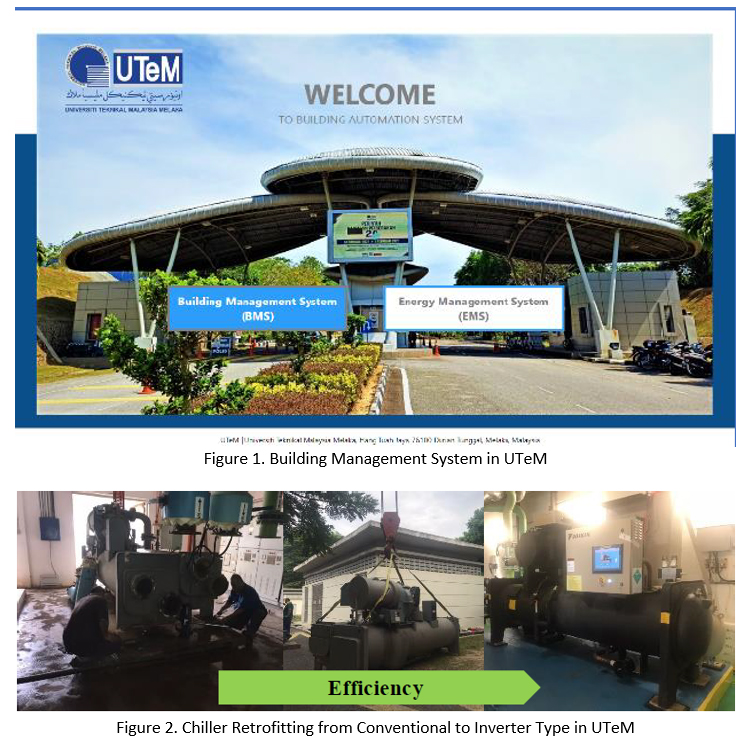
Program 2: Vehicle Ban Program for Year 1 and Year 2 Diploma/Degree Students
Under this program, Year 1 and Year 2 students are prohibited from bringing personal vehicles for daily use inside the campus. This policy aims to reduce traffic congestion, improve campus safety, and promote sustainable transportation practices such as walking, cycling, and using campus shuttle services. It also helps minimize carbon emissions and supports UTeM’s green campus initiatives. The program has been in place since 2017, as officially documented in Administrative Circular No. 26 of the Year 2017, and continues to be enforced to maintain an eco-friendly and pedestrian-friendly campus environment.
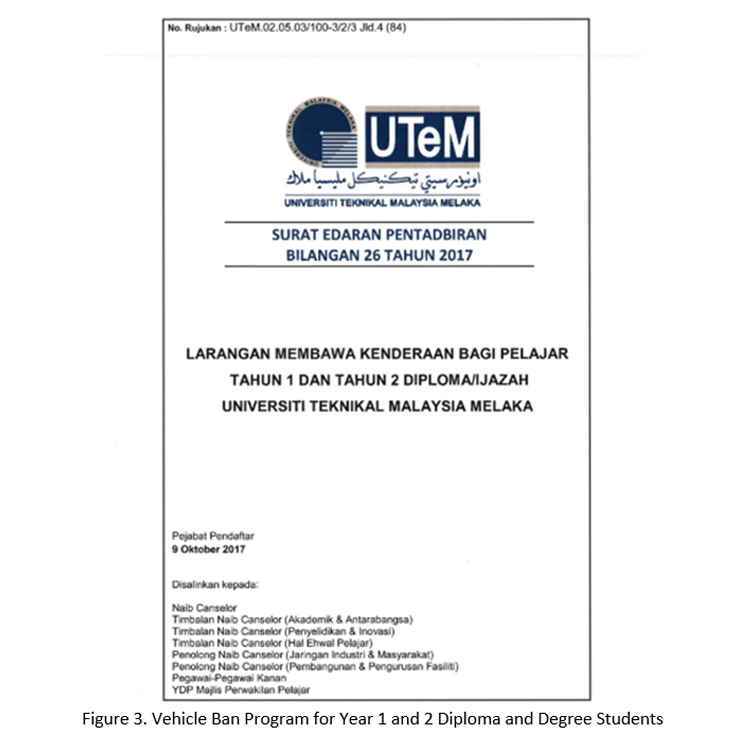
Program 3: 3R (Reduce, Reuse and Recycle) Program for University Waste
SWM Environment, the solid waste collection company for Melaka State, has contributed a Cage Type Recycling Centre to Universiti Teknikal Malaysia Melaka (UTeM), located at the student hostel area. This initiative has positively influenced recycling practices among students and staff. With the company's collaboration, the management of recyclable waste at all Recycling Centres is carried out in a systematic and efficient manner. A special Fabric Recycling Centre has also been set up at the campus centre through a collaboration between SWCorp Malaysia (Solid Waste and Public Cleansing Management Corporation), Kloth Malaysia Sdn. Bhd., and Life Line Clothing Malaysia (LLCM). This centre uses a Container Type Recycling Centre to collect various types of fabric in designated containers.
Additionally, UTeM promotes innovation in recycling through the Smart Compost IoT-System, which supports organic waste recycling using smart containers. UTeM promotes sustainability through recycling programs that collected over 224 tonnes of recyclable waste in 2023, reducing landfill contributions and associated greenhouse gas emissions. UTeM is expected to collect approximately 380 tonnes of recyclable waste in 2024, continuing its strong upward trend in sustainability efforts through expanded recycling programs, partnerships, and campus-wide initiatives.
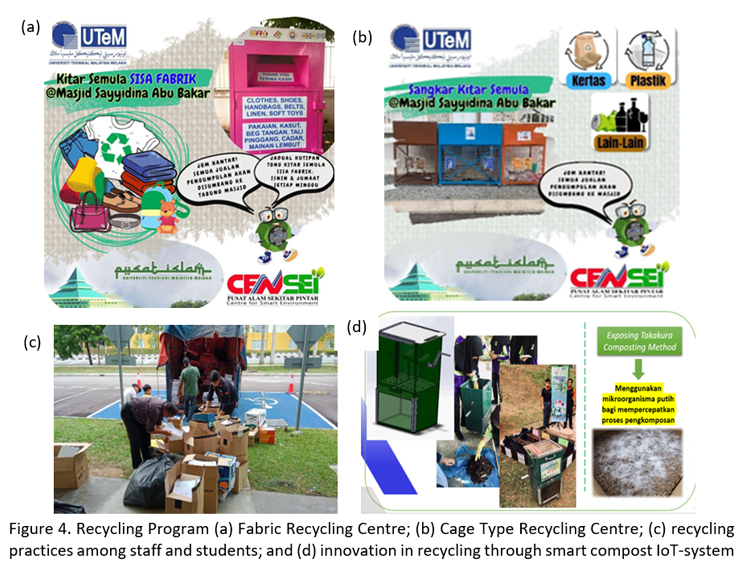
UTeM adopts an integrated approach to minimize environmental impact and reduce carbon emissions. The university has installed air pollution control systems to monitor and manage emissions, ensuring 100% compliance with Department of Environment (DoE) standards. These efforts directly contribute to lowering carbon output and improving air quality. Wastewater is fully treated before discharge, and all scheduled (toxic) waste is managed according to DoE regulations, preventing harmful pollutants from entering the environment.
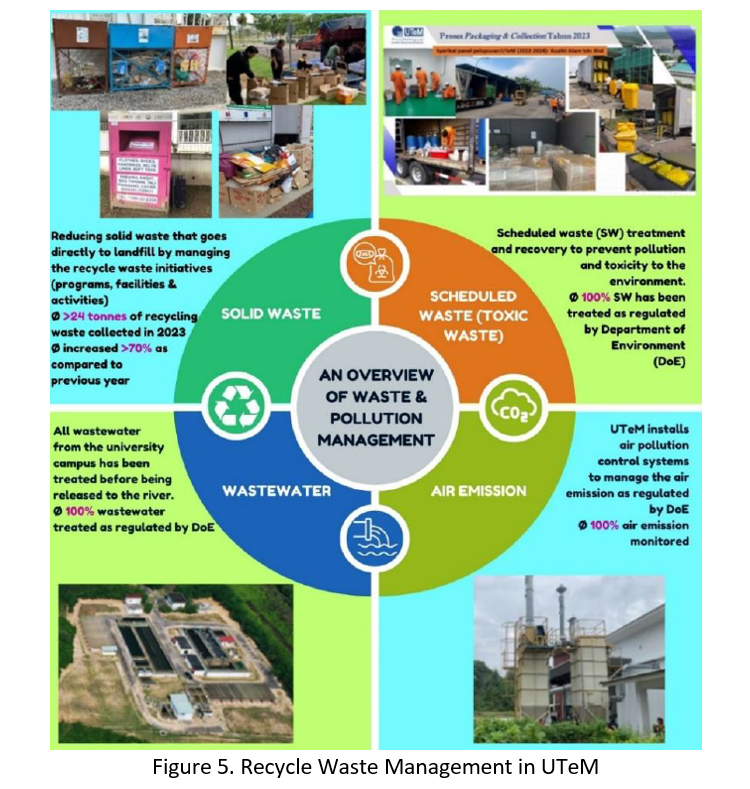
The Total Carbon Footprint (CO2 Emission In The Last 12 Months, In Metric Tons)
As an auditee participating in the UI GreenMetric assessment, we understand the critical importance of evaluating our institution's environmental impact, particularly concerning the Total Carbon Footprint criteria. This criterion not only measures our carbon emissions but also assesses our commitment to mitigating climate change. We recognize that our carbon footprint plays a significant role in our overall sustainability efforts and that reducing it is essential for the well-being of our planet. Through this evaluation, we aim to demonstrate our dedication to environmental responsibility, as we strive to minimize our carbon emissions, adopt sustainable practices, and contribute to a greener and more sustainable future for all.
Option 2: Recommended by UI GreenMetric
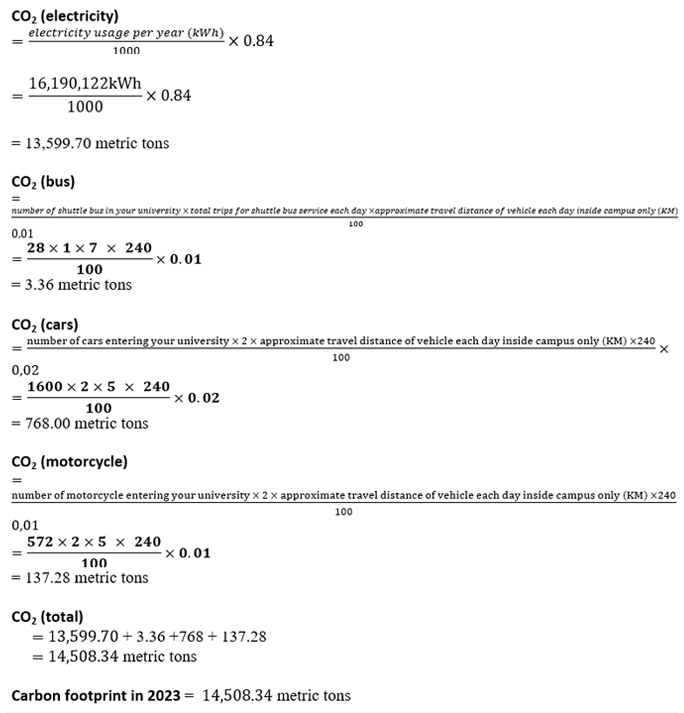
The post-pandemic period of COVID-19 has seen a concerning increment in carbon footprints at universities. This rise can be attributed to several factors, including increased energy consumption as institutions strive to maintain a safe and hygienic environment through enhanced ventilation and cleaning protocols. The transition to online learning has also led to a surge in data center energy use, contributing to higher carbon emissions. Additionally, the resumption of in-person activities has led to increased transportation-related emissions as students, faculty, and staff commute to campuses, which were largely deserted during the pandemic. These combined factors have resulted in a notable uptick in universities' carbon footprints, highlighting the need for sustainable practices and a reevaluation of the higher education sector's environmental impact.
